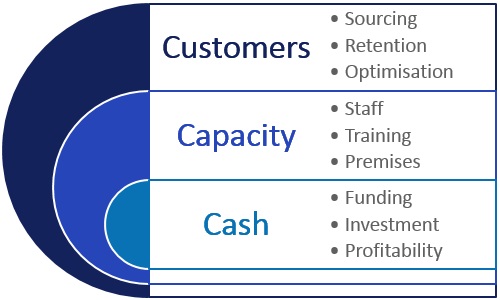There are many benefits to parachuting in an external consultant, from helping your business grow, to raising funds, to helping you reach new markets or retain valuable clients. Andrew Kerry-Bedell looks at the best way to bring in a business specialist to help you with a particular discipline such as strategy, sales, marketing, branding or to raise finance.
Businesses usually bringing in specialists because they don’t have the time or suitable expertise in-house, a common issue for many small organisations. And a consultant can add value quickly, identifying barriers to business growth and enabling you to improve your customer awareness, financial stability and market competitiveness.
By hiring externally, companies can also instantly gain specific skills for certain projects, get an outsider’s perspective without an emotional investment to the business, and augment a business team to give them more resources for time-dependent tasks.
It is obviously important to understand what consultants are, what they do and how they achieve what you want from them. Think of any consultant as an expert in their field, usually focusing on a narrow set of specialties that they excel in deploying across a wide variety of market sectors. For example, A marketing consultant will be able to apply their skills to implement suitable solutions regardless of the industry or challenges faced by their client, whereas a finance consultant will be able to look at a business and map out a strategy to improve working capital and future funding.
The challenge for business owners is ensuring that they are utilising the resources of a consultant to the fullest and not putting any barriers in their way that might impede their potential success. There are four key factors to consider before investing in an external consultant.
Tell it how it is
For consultants to fully understand how your business ticks, they must have full visibility of the entire company. This includes the good and bad, financial issues, internal staff issues and everything in between. It is all too common for businesses to try to hide these negative aspects from external parties, but giving them this knowledge will help your consultants understand the landscape in which they are operating in, which will be critical for them to be successful.
Establish targets
Both parties should know what results are expected and being evaluated and nothing should be taken for granted. This discussion should be had before a plan of action is created, and ideally in advance of any longer term support contracts being signed. Without a joint understanding of the metrics used to measure expected success, one party may be under the impression that a project is going well, while the other might be woefully disappointed.
Discuss non-disclosure and intellectual property
It is a good idea to discuss what information is confidential within any documents or collateral shared, as well as who owns the intellectual property rights for any content created. Having this agreement at the beginning of the relationship avoids future misunderstandings. If in doubt, make sure you both sign a suitable contract and mutually acceptable Non Disclosure Agreement.
Explore challenges rather than setting objectives
Consultants are specialists who, by nature, will seek the best solution to the challenge laid out in front of them. By outlining the challenges faced by the business, the consultant can explore the causes and outline the best solutions, enabling the business to set objectives alongside any relevant staff of stakeholders. In the field of marketing, this could be a business hiring a consultant to improve the customer awareness, benefits and competitiveness of a product or service, rather than exploring the challenge of driving more traffic to the website, or taking a step back further to attract more sales leads.
Conclusions
By giving external consultants the ability to fully deploy their skills against a challenge, instead of assuming a solution and finding someone to deploy it, creative solutions can be found and companies can get a valuable new viewpoint on the obstacles they are facing, as well as the best options to solve them, helping to aid future growth.





